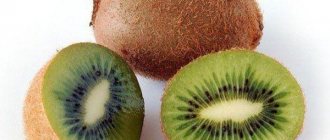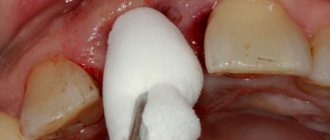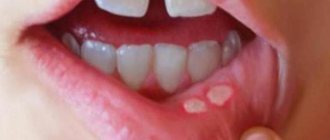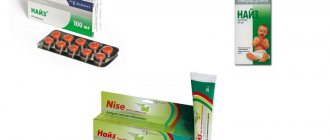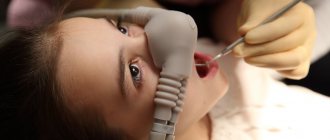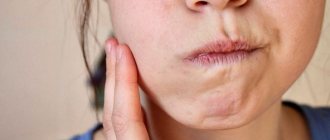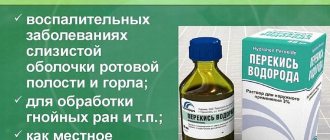Potassium permanganate is simply called "potassium permanganate". This powder can be found in any home medicine cabinet.
Potassium permanganate has pronounced antimicrobial, antiseptic and astringent properties. It dissolves well in liquid, coloring it soft pink.
Potassium permanganate is used to gargle to relieve symptoms of acute respiratory viral infections and acute respiratory infections (tonsillitis, tonsillitis and pharyngitis). Our grandmothers also used the “pink rinse” recipe, but does it make sense to introduce this procedure into your treatment plan?
Is it possible to rinse
Potassium permanganate can cause burns to mucous membranes. The severity of the burn is proportional to the concentration of the solution; potassium permanganate must be used carefully, dosing the amount of powder.
Rinsing as a physiotherapeutic method is prescribed to all patients. But following the instructions, you may encounter individual intolerance.
Mandatory requirements:
- Gargle only with fresh solution;
- Rinse for no longer than 30 seconds;
- Do not swallow liquid during or after rinsing;
- Treat after meals;
- Do not combine the drug with sugar and coal (the oxidizing agent cannot be used with other oxidizing substances);
- The treatment course lasts a maximum of two days.
Attention! In addition to a remedy for combating sore throat, the powder is used as a vomiting agent and a wound disinfectant (in certain dosages inherent in each direction of treatment).
The use of potassium permanganate for diseases of the teeth and oral mucosa
Never wrap a sore spot in scarves, do not apply heating pads, or sleep on a sore cheek, as your face may “get better” by a third overnight. In my practice (I once worked as an oral and maxillofacial surgeon), there was a case when a woman suffering from toothache was brought to the department. To escape the pain, she slept all night, leaning against the warm radiator.
And when we saw her, we ourselves almost suffered from periodontal disease... In general, it is more appropriate to tell this story in the anecdote section.
But here's the consequences of that dream - in the horror section! Therefore, having understood the first rule: “Never warm the sore spot from the outside,” learn the second: “Always warm it from the inside!” It’s paradoxical, but the fact remains: hot rinses are useful for almost all dental diseases! Just remember: the rinse must be hot (within reason, of course), and it is better if it is an infusion of medicinal herbs - sage or chamomile - or a pale pink solution of potassium permanganate. It is better not to use baking soda. Although it disinfects well, when used privately it can burn the oral mucosa, and in case of periodontal disease it is generally harmful.
- Gargling for sore throat - pharmaceutical preparations and folk remedies
Well, now about rinsing as a process. What he imagines is not at all what is commonly thought: not a loud gurgle over the sink. (We are not treating the throat, but the teeth, so we will arrange hot baths just for them.
) Let's put some healing solution into the cheek and... sit down to watch TV. As soon as the liquid cools down, it needs to be spat out and replaced with a new one. One procedure requires 1 glass of rinsing solution.
In general, such procedures need to be done at least 5-10 per day.
I will probably upset some by saying that rinsing with alcohol, cognac and other strong drinks has nothing to do with hot rinsing!
Pulpitis
If you periodically suffer from toothache that radiates to your ear or temple, if it bothers you at night and occurs due to temperature changes, it is likely that you have pulpitis.
Pulpitis is inflammation of the inner part of the tooth (pulp) as a result of caries or injury. It is likely that there is a cavity in the tooth.
It needs to be cleaned of food debris and then washed with a warm pink solution of potassium permanganate. After this, fill the cavity with cotton wool, which should be changed after each meal.
Before visiting a doctor, it is not advisable for the patient to drink coffee, cocoa, or alcohol. It's better to sleep half-sitting.
Herpetic lesions of the mucous membranes of the mouth
For this unpleasant disease, rinsing the mouth with a pale pink solution of potassium permanganate is prescribed. The procedure is carried out twice a day for a week: after meals and at night. If the disease does not subside, the treatment time is extended.
Tags: potassium permanganate, periodontal disease
- How to harden the throat: hardening for an adult with chronic pharyngitis
Source: https://nmedik.org/ispolzovanie-margancovki-pri-zabolevaniyax-zubov.html
Does it help cure a sore throat?
Scientists have proven that potassium permanganate is not effective in treating sore throat. Local agents (which is a solution of potassium permanganate) do not penetrate into the deep layers of tissue where the source of infection is localized.
Local antiseptics destroy bacteria that, in minimal quantities, along with pus, have reached the surface of the tonsils. This means that rinsing is good as an additional means of pain relief, disinfection and stopping the spread of infection.
Regular rinsing not only removes bacteria from the lining of the tonsils, but also washes away purulent plaque. Because of this effect, the procedure is indicated in the late stage of angina, when purulent abscesses begin to open and settle on the walls of the throat in the form of sediment.
Pros and cons
What happens, we can shake out half of the expensive contents of our home medicine cabinets and put in a single bottle of potassium permanganate? Fortunately, in addition to being cheap, this product is also economical - one package is enough for years of use! Perhaps this would be worth doing if not for the warnings of doctors, most of whom are extremely skeptical about this medicine.
Article on the topic
The Internet is the cure for all ills. 7 self-medication methods that should not be repeated
Ophthalmologists are horrified by recommendations to wash the eyes with potassium permanganate, since almost half of all chemical eye injuries occur due to an incorrectly prepared solution. After all, if the smallest undissolved crystal of the drug remains in the water, then a burn to the cornea cannot be avoided.
Gynecologists unanimously condemn douching with potassium permanganate: even if you accurately calculate the dosage and do not cause a burn to the mucous membrane, you can cause dryness and worsen the vaginal microflora. And the idea of protecting yourself with potassium permanganate from sexually transmitted infections and unwanted pregnancy is completely absurd!
Pediatricians also do not approve of bathing babies in pink water - it excessively dries out the delicate skin of babies. It is much better to use chamomile or string extracts for this purpose - if the child is not allergic to them.
Dermatologists don’t even want to hear about amateur cauterization of calluses and warts with potassium permanganate or any other method - after all, before removing a tumor, you need to confirm its safety. And it is better to remove warts professionally, rather than in a homemade way.
As for everything else, potassium permanganate can, in principle, be used. A weak solution can be taken for diarrhea, but modern enterosorbent preparations are more effective. You can rinse your mouth and throat with potassium permanganate to treat sore throat and stomatitis. But special antiseptics work better.
"Wild" medicine. How were primitive people treated in the Stone Age?
More details
How to dilute potassium permanganate
Contact of potassium permanganate with organic substances leads to the release of atomic oxygen. It is oxygen that acts on pathogenic organisms, destroying them. And when restored, the drug forms a complex bond with proteins and has an astringent effect.
Minimal dosages do not harm tissues, but highly concentrated potassium permanganate cauterizes and irritates. Overdose is determined by accompanying symptoms: pain in the throat and digestive tract, vomiting and stomach upset.
The lethal dose for an adult is 0.3 - 0.5 kg, and for children only 3 grams. If the proportions of potassium permanganate in the solution have been violated, ascorbic acid and cyanocobalamin will help neutralize the poisoning.
Preparation of the solution:
- Pour warm water into a glass;
- Using a slightly moistened toothpick tip, take a few grains of powder and add to the water;
- Stir until completely dissolved (solid particles settled to the bottom may cause burns if swallowed);
- Add water if the solution is too saturated (ideally it should be pale pink, almost transparent).
Medicinal properties of potassium permanganate
Potassium permanganate (potassium permanganate) is produced in the form of a purple crystalline powder.
Before use, the drug must be diluted in water in compliance with certain proportions. A solution of potassium permanganate has several useful properties:
- Antimicrobial.
- Anti-inflammatory.
- Antiseptic.
- Antifungal.
Potassium permanganate acts as a neutralizer of toxic products released by pathogenic bacteria during their life processes. The product dissolves well in water, after which a specific chemical reaction occurs. As a result of interaction with the liquid, oxygen is released, which causes a pronounced disinfecting effect when a sore throat occurs.
Proper rinsing
A proper rinsing process is more than just gurgling liquid. The correct sequence of actions must be followed.
The solution must be warm, but not hot. Cold liquid will aggravate the course of the disease, and hot liquid will create unwanted stress for the irritated mucosa.
- Place a comfortable amount of solution into your mouth;
- Tilt your head back while pushing your tongue forward;
- Try to repeat the sound “s” to provide fluid access to the distant parts of the pharynx;
- Do not complete the procedure earlier than 30 seconds after it began;
- Spit out the water with potassium permanganate and do not rinse your mouth.
Repeat the treatment three to five times a day. The remaining solution from rinsing should be poured out (it turns into a favorable environment for the growth of bacteria).
You can eat after rinsing within 40 minutes.
Side effects of potassium permanganate
The biggest mistake is treating an infection with rinsing alone. Potassium permanganate is not able to suppress the causative agent of the disease. If the patient limits himself to topical medications, serious complications are possible after the disease and during its course.
At small dosages, potassium permanganate does not produce side effects. But it is important to consider the level of sensitivity of the body. Some people experience allergies to the drug or burns even with a weak dilution of the powder. An allergy or overdose can be determined by redness, swelling, the appearance of a cloudy film and bubbles, itching, and burning.
If after rinsing the patient feels a deterioration in his condition, he should immediately rinse his throat and mouth with clean water, go to the hospital or call a doctor at home.
A feeling of dryness in the mouth and throat, a feeling of tightness is a normal reaction to the drug. If the condition causes discomfort, use a little butter (on the tip of a teaspoon) before bed to lubricate your throat.
Main contraindications
- Age up to 3 years (the baby does not know how to gargle and does not understand the seriousness of the procedure, so there is a high probability of using the medicinal product orally when swallowing);
- Damage to tooth enamel (potassium permanganate will aggravate dental problems and increase sensitivity in the presence of thinned enamel);
- Pathologies of the thyroid gland (in this case, it is better to obtain permission to rinse from a doctor).
Potassium permanganate is a popular remedy that is cheap. Moreover, preparing the solution and rinsing takes little time, which is very convenient.
Watch additional video:
If you strictly adhere to the recommendations, potassium permanganate will play a positive and not the least role in recovery, and will also help you endure the disease more easily.
Is it possible to gargle with potassium permanganate?
It is allowed to use potassium permanganate for gargling from the age of 6 years. Its use will bring positive results for various ENT diseases:
- tonsillitis;
- tonsillitis;
- pharyngitis.
With the development of these pathologies, a solution of potassium permanganate will help destroy pathogenic flora and speed up the healing process. The drug disinfects the surface of the tonsils and has drying properties . The product can be used alone or combined with various medications.
Despite the variety of modern antiseptics, potassium permanganate still remains a popular remedy used to combat pathogenic bacteria in various medical fields.
